Charles Somerset,Marquess of Worcester was an English nobleman and politician.

Dunster Castle is a former motte and bailey castle,now a country house,in the village of Dunster,Somerset,England. The castle lies on the top of a steep hill called the Tor,and has been fortified since the late Anglo-Saxon period. After the Norman Conquest of England in the 11th century,William de Mohun constructed a timber castle on the site as part of the pacification of Somerset. A stone shell keep was built on the motte by the start of the 12th century,and the castle survived a siege during the early years of the Anarchy. At the end of the 14th century the de Mohuns sold the castle to the Luttrell family,who continued to occupy the property until the late 20th century.
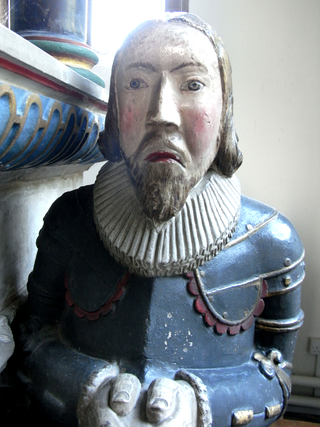
Sir Francis Popham (1573–1644) of Wellington,Somerset,was an English soldier and landowner who was elected a Member of Parliament nine times,namely for Somerset (1597),Wiltshire (1604),Marlborough (1614),Great Bedwin (1621),Chippenham 1624,1625,1626,1628–29),and for Minehead (1640–1644).

Francis Luttrell (1628–1666) of Dunster Castle,Somerset,was an English lawyer and politician who sat in the House of Commons at various times between 1656 and 1666.
Sir William Bassett was an English landowner and politician who sat in the House of Commons between 1669 and 1693.

Henry Fownes Luttrell,of Dunster Castle,Somerset,was High Sheriff of Somerset from 1754 to 1755 and a Member of Parliament for the borough of Minehead from 1768 to 1774.

Alexander Luttrell of Dunster Castle,Somerset,was an English politician and land-owner who served as Member of Parliament for his family's pocket borough of Minehead from 1727 until his death. He was the last in the male line of the Luttrell family,which had owned Dunster Castle since 1376.

Margaret Fownes-Luttrell was a British heiress,the wife of Henry Fownes Luttrell. She was the heiress of Dunster Castle,under the stipulation in her father's will that her husband should take the additional surname of Luttrell. Four portraits of her exist in Dunster castle and a fifth at Bathealton Court.
Sir Charles Wyndham was an English politician who served as a Whig Member of Parliament from 1679 to 1701.
Francis Luttrell may refer to:
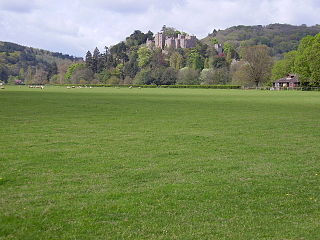
The feudal barony of Dunster was an English feudal barony with its caput at Dunster Castle in Somerset. During the reign of King Henry I (1100–1135) the barony comprised forty knight's fees and was later enlarged. In about 1150 the manors retained in demesne were Dunster,Minehead,Cutcombe,Kilton and Carhampton in Somerset,and Ham in Dorset.
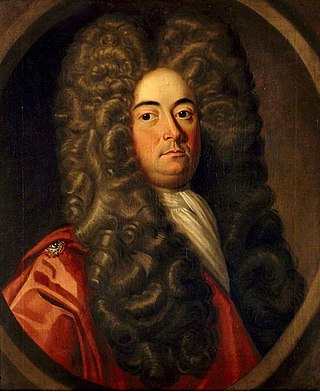
Alexander Luttrell was an English army officer and politician.

Thomas Luttrell (1583–1644) was an English politician from Dunster Castle in Somerset. In 1625 he sat in the Useless Parliament as a Member of Parliament (MP) for his family's pocket borough of Minehead.
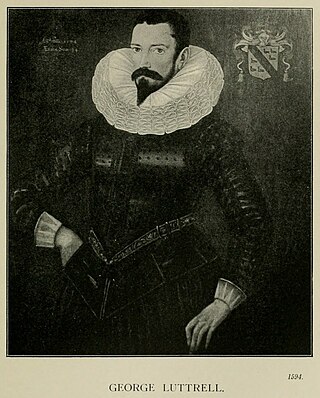
George Luttrell was an English politician from Dunster Castle in Somerset. In 1582 and 1584 he sat in the House of Commons of England as a Member of Parliament (MP) for his family's pocket borough of Minehead.

John Fownes Luttrell was an English Tory politician from Dunster Castle in Somerset. Like many previous generations of Luttrells since the 16th century,he was a Member of Parliament (MP) for Minehead,his family's pocket borough near Dunster. He sat in the House of Commons of Great Britain and then in the House of Commons of the United Kingdom from 1774 until his death in 1816,except for a few months in 1806–07.
Thomas Fownes Luttrell from Dunster Castle in Somerset was an English officer in the British Army and briefly a Tory politician. Like many previous generations of Luttrells since the 16th century,he was a Member of Parliament (MP) for Minehead,his family's pocket borough near Dunster.
Maurice Berkeley,3rd Viscount Fitzhardinge,known as Sir Maurice Berkeley,Bt from 1660 to 1668,was an English politician,of the Bruton branch of the Berkeley family.
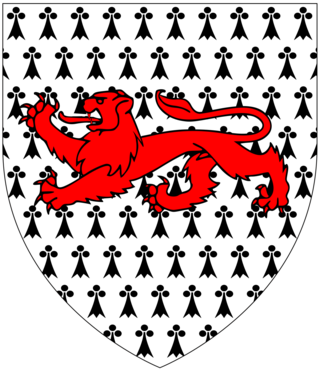
Samuel Drewe (1759–1837) of Kensington in Middlesex,was Governor of the Bank of England from 1828 to 1830. He had been Deputy Governor from 1826 to 1828. He replaced John Baker Richards as Governor and was succeeded by John Horsley Palmer.

John Fownes (1661–1731) of Kittery Court in the parish of Kingswear and of Nethway in the parish of Brixham,both in Devon,was a British landowner and politician who sat in the House of Commons from 1714 to 1715.
Sir Francis Warre,1st Baronet,of Hestercombe House,Kingston,Somerset,was a British landowner and Tory politician who sat in the English and British House of Commons between.1685 and 1715.












